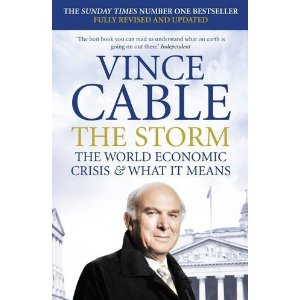What Vince Cable doesn’t tell us
 Catching up on some political reading after the election, I’ve been reading (or rather listening to) Vince Cable’s The Storm.
Catching up on some political reading after the election, I’ve been reading (or rather listening to) Vince Cable’s The Storm.
It’s an enjoyable and easy to follow account of the economic crash, light on jargon but not dumbed down in quality of argument. It does at times feel like it was written rather in a rush (as Vince Cable himself concedes) and partly as a result is more a selection of interesting accounts of different aspects of what’s happened to the economy laid out end-to-end rather than a book with a clear thread of argument running all the way through it.
As with other accounts it suffers rather from pointing out how many people made mistakes that now seem obvious, believing that it wasn’t a bubble that was building. The problem with that is that it doesn’t really help us work out what to do differently in the future. Even for people like Vince who gave warnings ahead of events there is still the question, “how can you be sure you are correctly identifying a bubble rather than a genuine systematic change in how the economy works?”
Such changes do sometimes happen, even if not as often as bubbles. A policy-making approach that views everything as a bubble will also end up making major mistakes. Major shifts in the economy are not always unsustainable or unwelcome. The long-term shift in the UK economy away from agriculture, for example, has been sustainable and policies over the decades, even centuries, based on fears that the country is going to run out of food if it doesn’t grow more have frequently turned out to look rather foolish.
The question of making accurate predictions in future is touched on a little, and referred to in the list of further reading, but in many ways the book is a much better guide to understanding the past than to making future decisions.
Understanding the past does usually help with the future though and the book is broader in its picture of the past than you might expect. It is not just about the credit market crunch; it also covers the changing international balance of economic power, the role of oil, matters of international trade and more.
You can buy The Storm: The World Economic Crisis and What it Means by Vince Cable from Amazon here (and note the audio download option if you prefer listening to a book whilst gardening, leafleting or baking chocolate cakes).
Leave a Reply